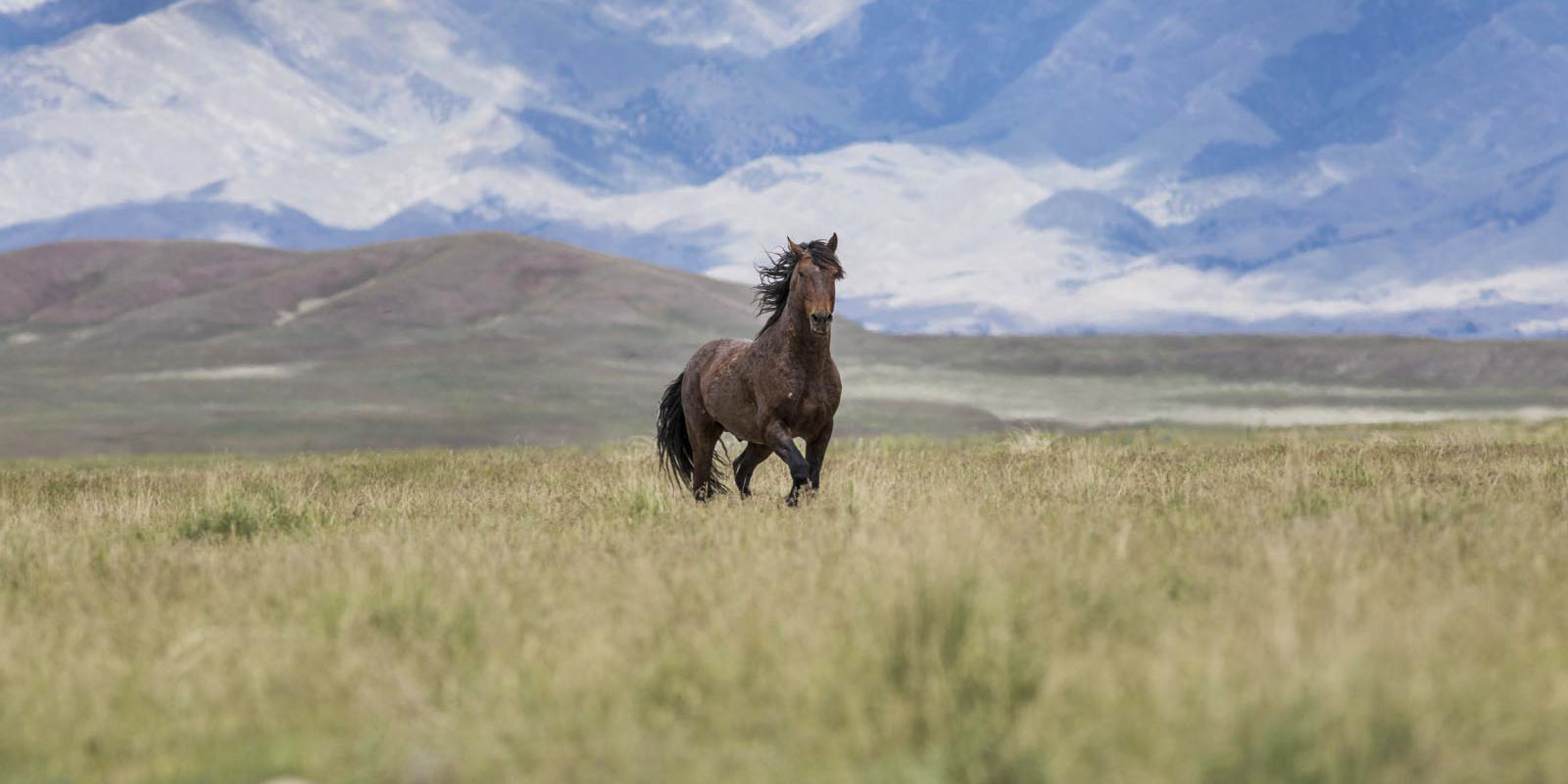The developer of a Northern Nevada industrial park that’s home to Tesla, Google, Walmart and other major companies stepped up his campaign to convince the state to backtrack on a plan to give up ownership of about 3,000 free range horses.
On Thursday, Lance Gilman delivered a letter warning Gov. Brian Sandoval the state’s giveaway plan could become a “huge political issue in Northern Nevada, putting Republican candidates at great risk with their constituents who favor the horses running free and preserving their way of life.”
It’s the second time in recent weeks that Gilman wrote Sandoval asking the governor to intervene and prevent the Nevada Department of Agriculture from enacting a plan to give up state ownership of horses in the Virginia Range, which includes the Tahoe Reno Industrial Center.
“I’m going to do everything in my power to see that we have a better outcome,” said Gilman, who is also a Storey County Commissioner.
At stake is the future of about 3,000 horses that live in an area roughly bounded by U.S. Highways 395 and 95A in the west and east and Interstate 80 and U.S. Highway 50 in the north and south.
Unlike wild horses in the rest of the state which are managed by the federal Bureau of Land Management, the Virginia Range horses are state property.
Until late October, they had been managed through a cooperative agreement with America’s Wild Horse Campaign, a private, non-profit horse advocacy group.
The deal called for the non-profit to keep horses off roadways, facilitate treatment or removal of injured or sick horses and application of birth control to help manage the population.
That agreement fell apart, however, with each side claiming bad faith on the part of the other.
Rather than issue a new agreement, the agriculture board decided to issue a request for proposals from non-profits willing to take ownership of the horses altogether.
Board members characterize it as a chance for the horses to get a fresh start with better management than the state can provide through cooperative agreements.
But horse advocates characterize it as certain doom for the animals. They say the fact the animals are treated similarly to livestock under Nevada law means the new owners would be liable for horse-vehicle collisions. That alone, they say, makes the plan unworkable.
They also say that once the state gives up ownership there is nothing to prevent private owners, even if they are well-meaning at the outset, from removing the horses from the range or even selling them for slaughter. The Virginia Range horses aren’t protected by the federal Wild Horse and Burro Act which prohibits removal for slaughter.
“We have tried everything to get the governor to have his administration just be reasonable, he is not even open to that,” said Deniz Bolbol, spokesperson for America’s Wild Horse Campaign, the non-profit that was the other party in the now-dissolved management agreement.
Gilman’s letter was a follow-up to his meeting with Department of Agriculture Director Jim Barbee.
In a prior letter, Gilman urged Sandoval to encourage Barbee to meet and discuss the horse issue.
In the Thursday letter, Gilman said the meeting “resulted in no movement whatsoever” and that Barbee “was not willing to meet with local wild horse advocates.”
Agriculture department spokesperson Rebecca Allured said Barbee was unavailable for a phone interview. She sent a statement from Barbee that said, “The Animal Industry division administrator and I met with Mr. Gilman in January, and we felt it was a positive meeting because he shared he was ready and willing to work with the advocacy groups to benefit the horses.”
In an interview with the RGJ, Gilman indicated the Barbee meeting wasn’t productive enough.
He wants Sandoval to assign a mediator to help both sides come to an agreement. He also wants the department to delay their effort to find new, private owners.
Gilman said he’s motivated by a desire to keep the horses healthy and free-roaming on the range because they’re important to major tenants.
Tesla co-founder and CEO Elon Musk and other corporate leaders have spoken favorably about the animals as an asset to the area.
“We have to make it very, very clear how important an asset they are,” Gilman said. “People are infatuated, they’re organized. They want the wild horse herds to remain wild.”
Gilman said he’d like to discuss alternatives to the existing plan.
His suggestions included shifting management oversight responsibility from the agriculture department to the Department of Wildlife.
He also said private businesses and advocates who support keeping the horses on the range and under state ownership would be willing to contribute money to management.
“There is more than one outcome we can bring to the table,” Gilman said. “Certainly, there is an appetite among many of the businesses relocating to Northern Nevada to help in that regard.”
Sandoval, who due to term limits is serving his final year as governor, did not respond to repeated attempts to reach him through a spokesperson.
Although Gilman wrote the horse issue could be decisive for Republican candidates, the three Republicans vying to become nominee to replace Sandoval in November showed little knowledge of or interest in the problem.
When asked by email if he agreed with the agriculture department's proposal to transfer ownership, Attorney General Adam Laxalt, considered the leading Republican gubernatorial candidate, responded he agreed with Sandoval, “that the best course of action is for the protesting group to work with the Department to ensure public safety while properly managing the Virginia Range population.”
Laxalt spokesman Andy Matthews didn’t respond to a follow-up email asking if he agreed with the current plan or supported state ownership of the animals.
Candidate Dan Schwartz, who is currently state treasurer, said through spokesman Rory McShane, “Storey and Lyon Counties should decide, since that’s where the horses are.”
When informed the horses are also in Washoe County and that the state, not counties, is charged with ownership and management of the animals, McShane said Schwartz wouldn't modify his statement.
Candidate Jared Fisher, a Las Vegas businessman, confused the Virginia Range horses with federally managed horses.
But he did say, in general, horse management should include humane population control, prevent starvation and protect people and horses from highway collisions.
"Something has to be done about it,” Fisher said. “There are human lives and wildlife both at stake.”


